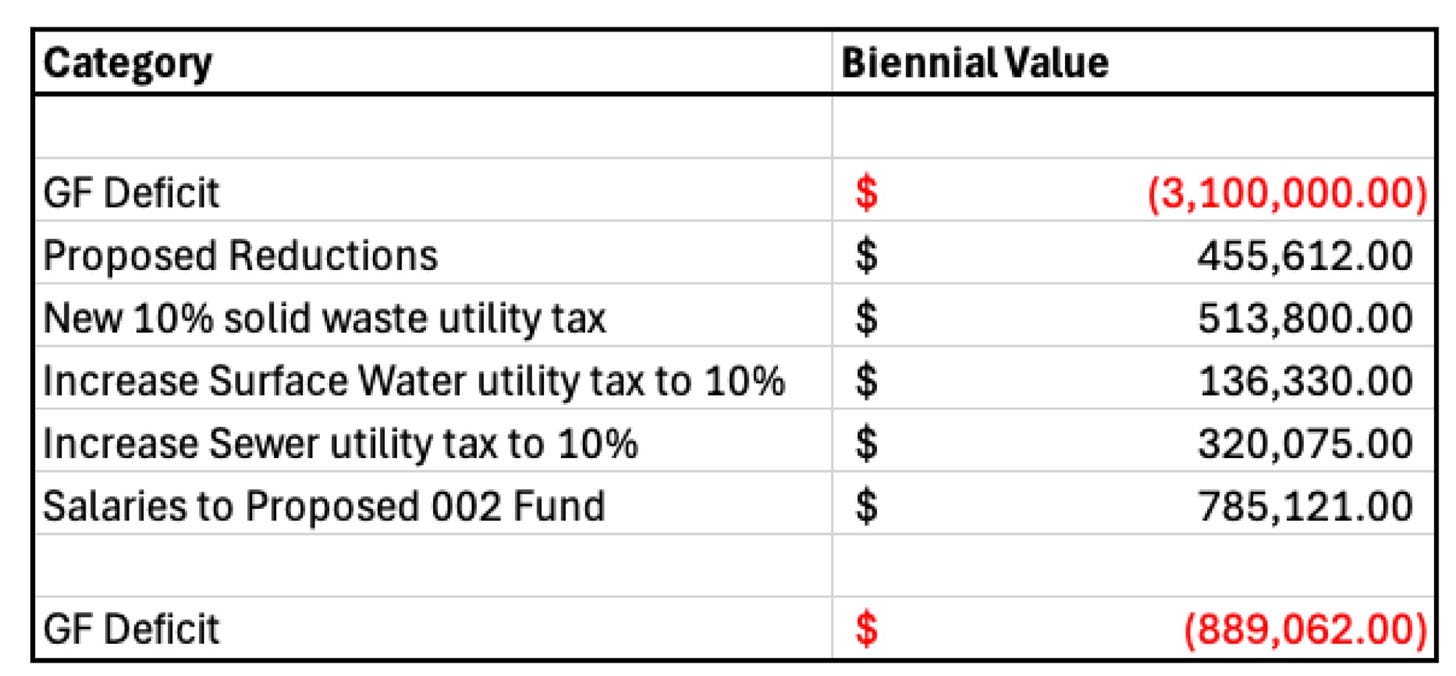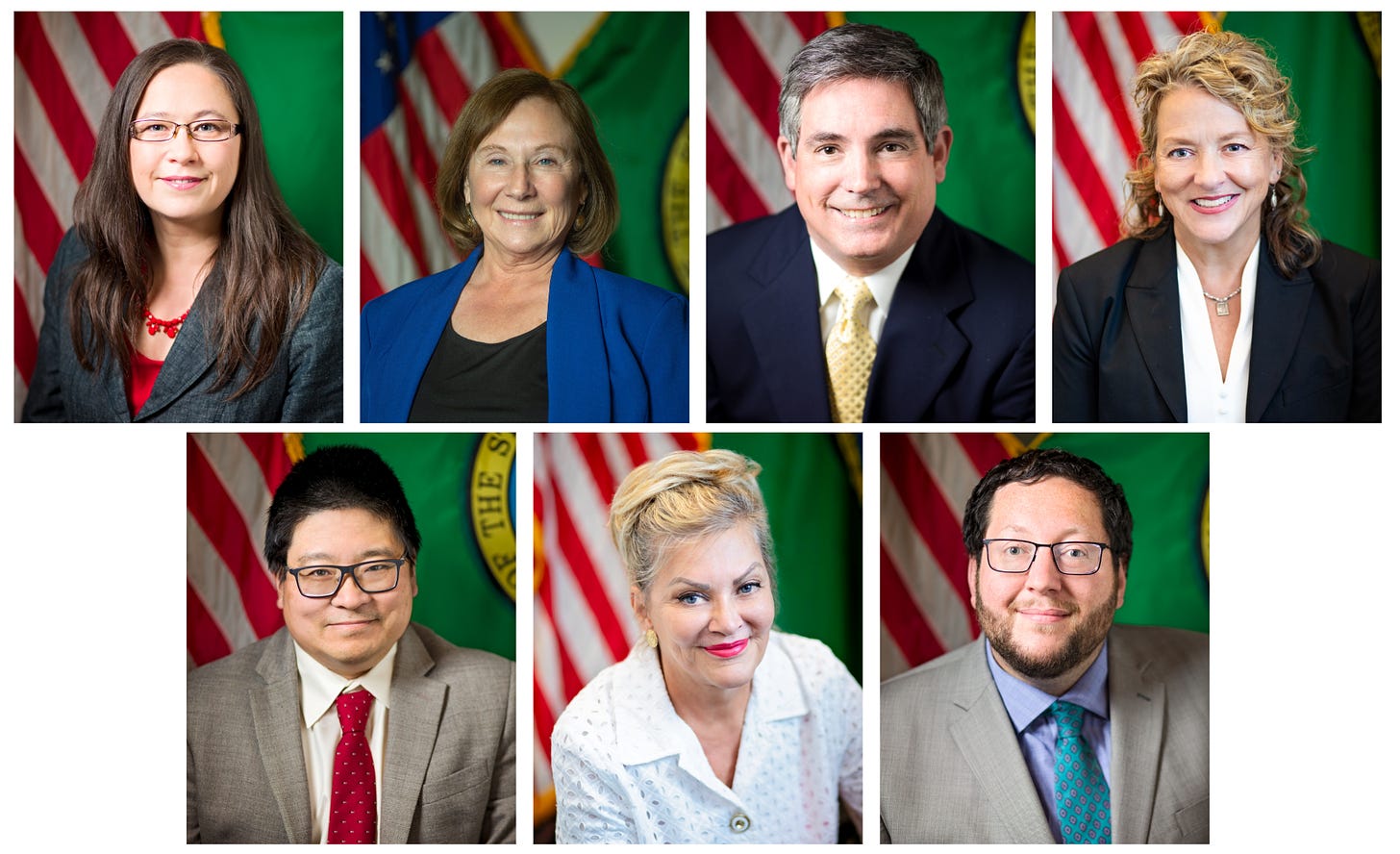Facing deficit, Lake Forest Park debates cuts, taxes and fees
Facing a $3.1 million budget deficit, the LFP council debated budget cuts taxes and fees. In a four-to-two split, the council voted to hire a consultant to help the city pass a levy
On November 7, the Lake Forest Park city council held its final public hearings on proposed tax and fee increases and the 2025-2026 budget. In a four-to-two split, the council voted in favor of hiring a consultant to help the city pass a levy lid lift.
Facing a potential $3.1 million budget deficit, the Lake Forest Park city council considered amendments to cut $455,612 from the budget while raising taxes and fees to generate $970,205. The city also could use $785,121 from the new traffic safety camera fund to pay for police and court clerk salaries. All together, the proposed budget amendments could reduce the deficit to $889,062.
The city says it is facing significant cost increases: insurance is up $109,000 per year, 911 dispatch service will cost $283,560 more per year, the city will pay $150,000 more to jail prisoners per year, public defenders cost $30,000 more per year and a police wage increase will add $100,000 per year in costs.

The city identified $455,612 in proposed cuts to the budget. To save $202,812, the city might postpone replacing some vehicles in its police and public works fleet (the city’s budget had said it plans to replace seven police vehicles over the next two years). The city may also cut $220,500 in human resource support spending and another $32,200 in smaller cuts.
In 2024, Lake Forest Park collected $3,473,591 in property taxes but under Washington State law, the city is allowed to increase that amount by only 1% (regardless of the rate of inflation) an increase of $34,736.

In a four-to-two split, the council voted to in favor of hiring a consultant for $96,000 to help the city pass a property tax increase - something that voters haven’t approved in Lake Forest Park in over a decade. A levy to pay for parks and sidewalks on the 2021 ballot was rejected by over 65% of Lake Forest Park voters and a 2010 property tax levy was rejected by 77.97%.
According to comments made to the council, the consultant would provide press releases, letters to the editor, social media posts, town halls and other activities to educate voters about a proposed property tax increase.
Councilmember Semra Riddle voted in favor of hiring the consultant and said, “I want to utilize this tool that we've been given to educate the community on budget and property taxes. Even if that's all we get out of it. That is just tremendously a major return on whatever amount of money we spend to get to that point.”
Councilmember Jon Lebo spoke against hiring the consultant “I think we're getting a little in front of ourselves…. We do have a budget issue that we need to resolve. And I think that how we present this to our citizens is very important. And what we're presenting to our citizens is that, even before we get a survey… we are going to hire a consultant who's going tell us how to put together a levy lift.” Instead, Lebo spoke in favor of a citizens committee, “I have advocated many times for a Citizens Financial Stability Committee really to bring along our citizens. And I think if we don't really spend the time of bringing them along as opposed to telling them how they should proceed, we are not going to be successful,” he said.
Another topic of debate was whether the city should charge a new solid waste (garbage) tax to fund a full time Climate Project Coordinator position to implement the goals in the Climate Action Plan the city adopted earlier this year. According to that plan, two thirds of greenhouse gas (GHG) emissions in the city come from fossil fuel-based air and road transportation and the number one goal in the plan is to cut GHG emissions in the city 50% by 2030 and 95% by 2050. Kenmore employs a Climate Action Plan Program Manager to administer its Climate Action Plan and Shoreline has a Sustainability Manager and Environmental Program Specialist to drive its Climate Action Plan.
Councilmember Paula Goode questioned the need for a Climate Project Coordinator, “We've heard a lot from our community about the climate action manager and part of me is in support of that. But when I keep thinking about what is the job description, and what will they do? I don't really know what they would do… It seems like a lot of money, for a pretty high paid position. I don't know what their functions would be.”
The city also plans to increase sewer and surface water fees and taxes. The city plans to increase sewer fees by 5% and, according to a presentation shared by the city, increasing sewer taxes by 10% could generate an additional $320,075. The city plans to increase surface water fees by 15% and could collect an additional $136,330 with a 10% surface water tax increase. Building and permit fees could also increase.
Without cuts and increased revenue the city expects its $9,912,822 general fund to shrink to $6,819,619 by the end of 2026. But the city expects one fund balance to increase from $289,000 to over $6 million: that fund is the new Traffic Safety fund the city created to collect revenues from the new school walk zone traffic safety cameras on 178th Street by Brookside elementary. The city is keeping revenue from the old cameras and the new cameras separate because a new state law requires the city to now spend funds on traffic safety improvements after paying operating costs (the city was previously allowed to deposit the revenue into the general fund).
The city transferred $150,000 from the traffic safety fund to the transportation fund for traffic calming but the city’s budget does not specify which traffic safety projects will be funded with the millions of dollars of revenue it expects to collect each year from the cameras. The city estimates those cameras will generate $8 million from fines over the next two years.
The city plans to spend $702,500 from the traffic safety fund revenue to cover 7% of the salaries and benefits for its police department to pay for a patrol officer and to cover the cost of having officers review each ticket. Previously, Washington State law required automated traffic camera citations to be reviewed by police officers, but the new state law now allows cities to use civilian employees to review the tickets to reduce costs. The city will also use $82,580 from the traffic safety fund to pay for new court clerks to handle the additional work load caused by thousands of citations per month.
The Lake Forest Park city council plans to vote on the final amended budget on Thursday, November 14 and is asking residents to provide input to solve the shortfalls in a survey at LFPcommunitysurvey.com.



